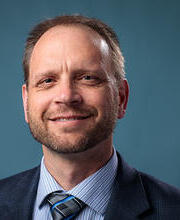Understanding and Interrupting Generational Trauma Transmission
Understanding and Interrupting Generational Trauma Transmission
Categories: AACC BLOG

by Phillip Monroe, Psy.D.
Take a minute and reflect:
What blessings do you see that have come
to you through the life and experiences of the previous generation of your family? Education? Faith? Economic stability? Work ethic?
What pains and suffering did you inherit from those before you? Addiction? Violence? Discrimination? Poverty? Inadequate education?
Notice that you have inherited both family and community blessings and wounds. How do we help others acknowledge traumas passed down through the generations and find ways to begin healing generational trauma?
Clinical discussions of post-traumatic stress disorder (PTSD) and ongoing trauma responses often only describe the impact of traumatic events on an individual. However, some trauma may be historical… consequences passed down from one generation to the next.
Consider this brief, but powerful, image from the book of Exodus: “So Moses told the people of Israel what the LORD had said, but they refused to listen anymore. They had become too discouraged by the brutality of their slavery” (Exodus 6:9, NLT).
Trauma disrupts every aspect of life—health, relationships, meaningful work, and faith. Four hundred years of brutal enslavement made it difficult for Israel to believe that God would deliver them. Those who listened to Moses could not imagine anything could be any different for them than for their parents, grandparents, and great grandparents. They could not listen because that would require hope. They needed to survive, and hope might threaten survival. While their woundedness certainly came from their own experiences of slavery, it stands to reason that it also came from the way slavery and oppression had impacted their forebears.
Survival often comes with a price for the next generation (Dashort et al., 2019; Mutuyimana et al., 2014). Consider the following image from Isabel Wilkerson’s book, The Warmth of Other Suns (2010).
In the 1940s, an African-American boy named George grew up in deeply segregated Eustis, Florida. It was paramount that he learn, and learn quickly, the rules of the caste system.
“All this stepping off the sidewalk, not looking even in the direc- tion of a white woman, the sirring and ma’aming and waiting until all the white people had been served before buying your
ice cream cone, with violence and even death awaiting any mis- step. Each generation had to learn the rules without understand- ing why, because there was no understanding why, and each one either accepted or rebelled in that moment of realization and paid a price whichever they chose. … No one sat George down and told him the rules. His father was quiet and kept his wounds to himself. George’s teachers were fear and instinct. The caste system trained him to see absurdity as normal” (p. 62).
Now imagine how such a lifetime of experience would impact the ability to form trust relationships in a community and how it would affect his raising of his children, even when some segregation and discrimination became less visible after the passing of civil rights legislation.
Generational Trauma and the Systems that Enable It
Guyton et al. (2021) provide a simple and helpful definition of generational trauma, “… when heart wounds are passed on from one generation to another within families and across communities” (p. 13). While the next generation may not experience the initial events that create chronic trauma symptoms, a cascade of biological, behavioral, emotional, and relational consequences may well transmit to the next generation. A hypervigilant parent who uses drugs to numb emotions, isolates and does not talk, explodes in angry outbursts, and expresses pessimism about
the future will have an obvious impact on children in the home. There is some evidence that trauma may also pass on changes in gene expression. In addition, certain social conditions and systemic structures supporting discrimination and community oppression encourage the transmission of trauma to the next generation. For example, the killing of an unarmed black man by law enforcement may trigger a trauma response within black communities because their experience tells them that they, too, are at risk when interacting with police officers.
Invitation to the Journey of Healing Generational Wounds
When therapists pursue a deeper understanding of the historical contexts in which clients live, help them acknowledge and lament wounds, observe latent resiliencies, and sup- port the development of new patterns to interrupt generational repetition, they are better positioned to facilitate clients’ recovery from generational trauma wounds.
Explore generational trauma. Many counselors use genograms and other family history tools to help build the picture of a client’s experience. Community timelines can also help illustrate shaping events, social norms, and cultural histories that impact clients beyond their family of origin. These exercises encourage clients to develop greater awareness of, and empathy for, their experiences. For example, one client chose to do a community timeline of her town. This town had suffered severe economic hardship after a highway was built, causing it to be bypassed. As she recounted this history, she recognized that some of her father’s alcohol-fueled rage in her home was directly connected to his inability to find a job that could pay for basic family needs. After the activity, she stated, “While I still suffered at the hands of my father, I have greater empathy for his experiences and feel that I am less to blame for his behavior.”
The reality of generational trauma is a sober reminder that the world does not work as it should and that broken relationships have consequences that often impact the lives of the next generation.
Invite corporate lament. Realizations such as I have just described naturally lead to opportunities for lament. In the Bible, laments are corporate expressions of pain to God, often in the form of questions and complaints. Psalm 6, 10, 13, 22, and 42-43 are just a few of the nearly 50 lament psalms in the Scriptures. These appear to be written down to validate our need to cry out to God together. Where are you? Do the dead praise you? Have you abandoned us forever? Such expressions have the counterintuitive impact of inviting us into greater intimacy with God, as well as to bear each other’s burdens. Consider Holocaust survivor Elie Wiesel’s articulation of how lament impacts his relationship with God amid deep and unanswerable faith questions: “I have not lost faith in God. I have moments of anger and protest. Sometimes I’ve been closer to him for that reason” (Berger, 1986). When clients write out their laments and speak them to their therapists, friends, families, and faith communities, they often report feeling a release from some of the pain they have been carrying. Guyton et al. (2021) provide instructions and methods to do this in settings outside of therapy and official worship services.
Support the disruption of generational wounds.
Changing culture and a community history feels about as possible as moving a large ship under our own strength. In her latest book, Redeeming Power: Understanding Authority and Abuse in the Church, psychologist Diane Langberg (2020) tells the story of a pastor who asked her how he could make any change in a village where all the men there were alcoholics, batterers, and had sex with their own daughters. How could he change anything? He could do so by choosing to be a light, to be different with his wife and daughters. That might not seem to do much, but it would introduce a change in his family and invite others to new ways of being.
When we help our clients consider ways to introduce positive change in their immediate families and communities, we remind them that they are indeed able to embody evidence of transformation. They might introduce new traditions and sayings into their families. They might invite conversations about some of the wounds their families carry. They might choose to tell forgotten stories of survival, resilience, and strengths borne out of hardship.
The reality of generational trauma is a sober reminder that the world does not work as it should and that broken relationships have consequences that often impact the lives of the next generation. However, we take comfort in the fact that generational blessings also exist. In Isaiah 61:4 (NLT), we see that those who are healed are empowered to heal and restore the entire city: “They will rebuild the ancient ruins, repairing cities destroyed long ago. They will revive them, though they have been deserted for many generations.”
This article originally appeared in Christian Counseling Today, Vol. 25 No. 1. Christian Counseling Today is the flagship publication of the American Association of Christian Counselors. To learn more about the AACC, click here.

PHILIP G. MONROE, PSY.D., is director of the Trauma Healing Institute at American Bible Society. He is visiting Professor of Counseling and Psychology at Missio Seminary, where he and Dr. Diane Langberg founded the Global Trauma Re- covery Institute.
References
Berger, J. (1986, October 10). Man in the news; Witness to evil: Eliezer Wiesel. The New York Times. https://www.nytimes. com/1986/10/15/world/man-in-the-news-witness-to-evil- eliezer-weisel.html.
Dashorst, P., Mooren, T.M., Kleber, R.J., de Jong, P.J., & Huntjens, R. (2019). Intergenerational consequences of the Holocaust on offspring mental health: A systematic review
of associated factors and mechanisms. European Journal of Psychotraumatology, 10(1), 1654065. https://doi.org/10.1080 /20008198.2019.1654065.
Guyton, D., Hill, H., Monroe, P., Drew, H., & Hennein, M. (2021).
Healing the wounds of generational trauma: The black and white American experience. Philadelphia: Trauma Healing Institute.
Langberg, D. (2020). Redeeming power: Understanding authority and abuse in the church. Grand Rapids: Brazos Press.
Mutuyimana, C., Sezibera, V., Nsabimana, E., Mugabo, L., Cassady, C., Musanabaganwa, C., & Kayiteshonga, Y. (2019). PTSD prevalence among resident mothers and their offspring in
Rwanda 25years after the 1994 genocide against the Tutsi. BMC Psychology, 7(1), 84. https://doi.org/10.1186/s40359-019-0362-4.
Wilkerson, I. (2010). The warmth of other suns: The epic story of America’s great migration. New York: Vantage Books.
